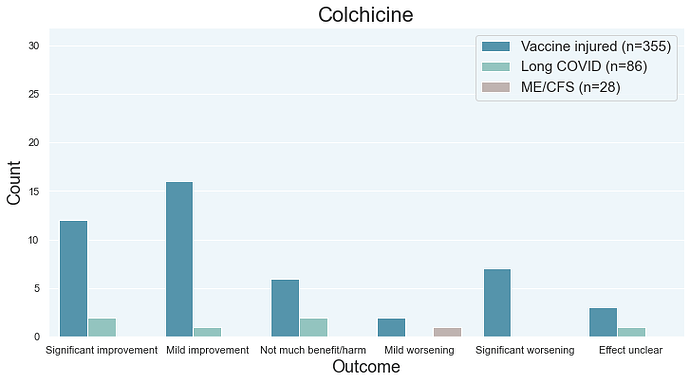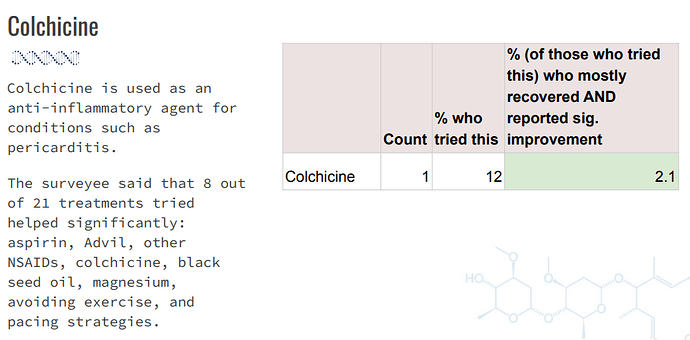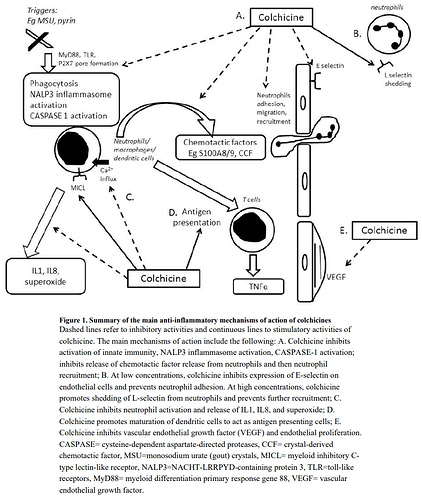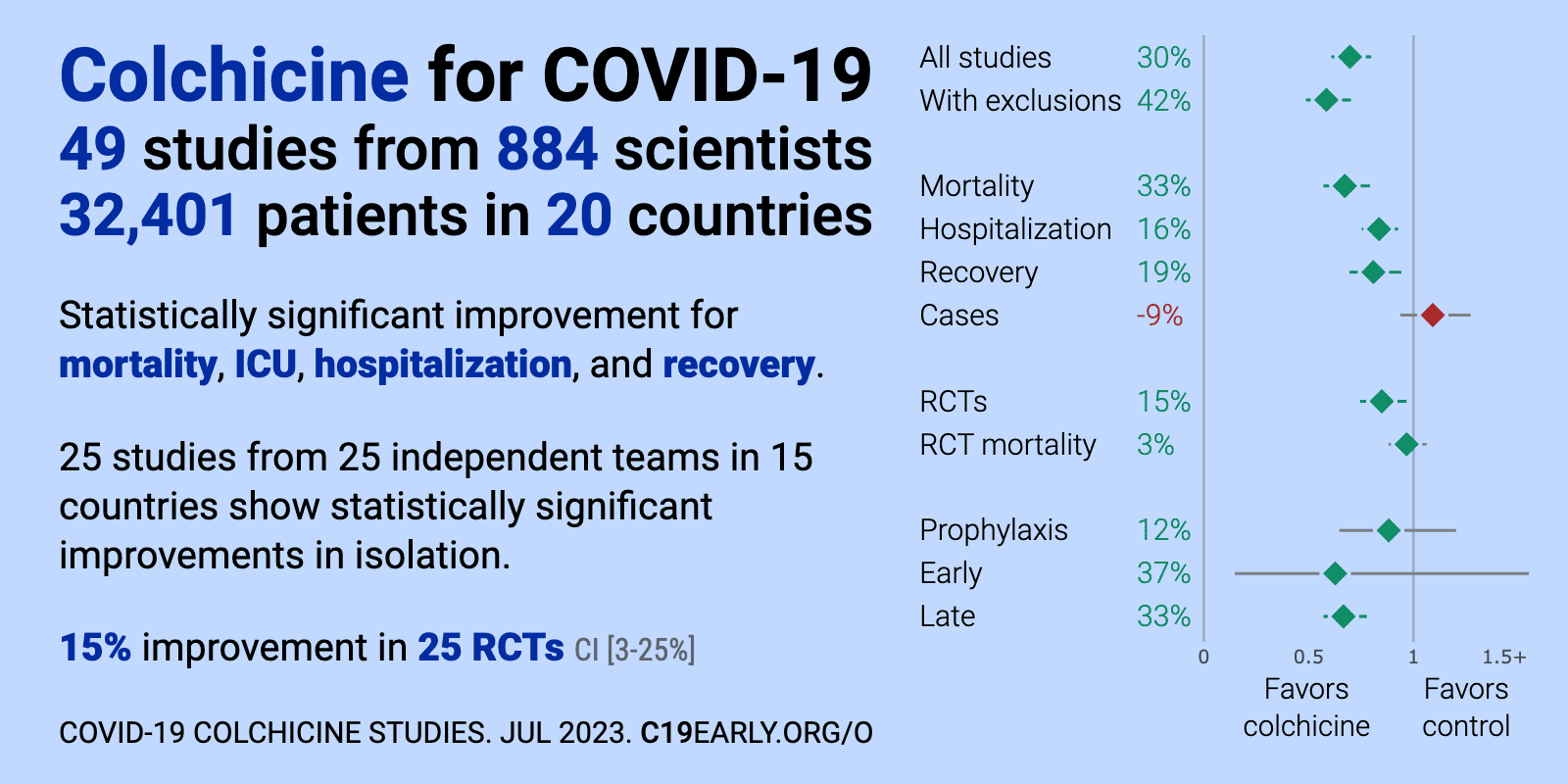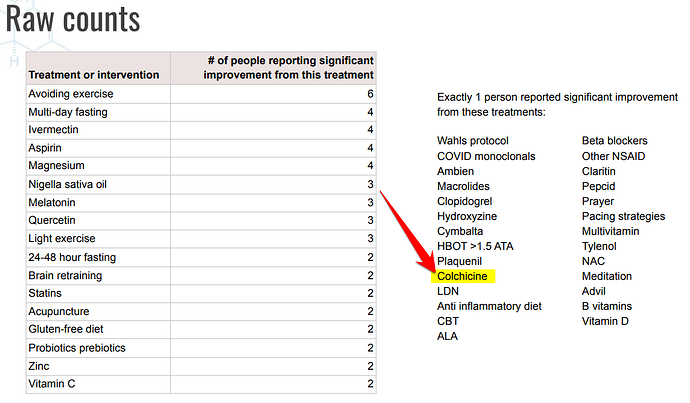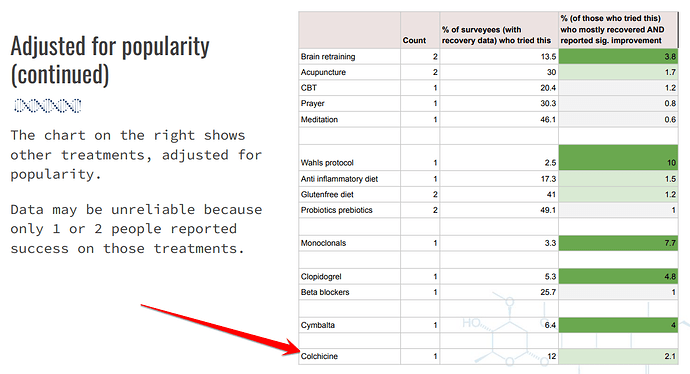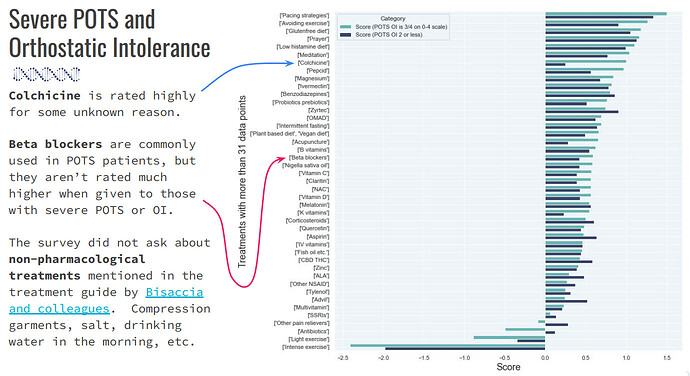Colchicine does things and is one of the ‘high-risk’ drugs being used in chronic illness patients. Its high rate of significant worsening is right up there with the top 10 riskiest drugs/treatments. Here is where it falls risk-wise.
Treatment Outcomes Survey analysis-3 points for significant worsening, -1 point for mild worsening. Risk score is the average points per person.
There is also a high rate of people reporting significant improvement.
search for colchicine at Treatment Outcomes Survey analysis
Does it help people recover and get their life back?
Out of 27 people on the survey who mostly recovered, 1 of them was mostly recovered and rated colchicine as leading to ‘significant improvement’.
This individual also rated 7 other things as leading to ‘significant improvement’, so their data may be slightly less reliable than people who rated fewer treatments highly. Here’s why: there may be a survey answering ‘style’ where the participant is overly optimistic about their treatments. If such as a style exists (it probably does exist), the surveyee would be rating their outcomes much higher than other people.
It may take around 48 people trying this drug to have 1 person who mostly recovers (and rates the drug highly). But don’t take this number too seriously because the sample size is too small to draw meaningful conclusions. It may also be the case that multiple successful treatments are needed to recover and that the numbers are low right now because people aren’t trying multiple effective treatments.
Popularity
It is most popular in post vax patients (13.0% tried it) and less so in Long COVID (7.0%) and ME/CFS (3.6%).
It’s reasonably popular. If this drug was a silver bullet for chronic illness, we would’ve seen that by now.
Colchicine started off as a natural drug
Colchicine comes from the autumn crocus plant (Colchicum autumnale). However, the use of the autumn crocus plant as a medicine fell out of favour so people today do not use the plant.
Mechanism of action
One extensive review article on colchicine (PMID:4656054) had this to say:
The exact mechanisms of action underlying its efficacy are not completely understood and remain under active investigation.
Scientists aren’t really sure! I’ll get into the details below, but feel free to skip ahead to the next section.
Tubulin disruption
Your cells contain tubulin proteins that polymerize into microtubules, which are the major components of the cytoskeleton inside your cell. Colchicine binds to tubulin and inhibits microtubule polymerization. Basically, it disrupts the cytoskeleton a little bit.
The disruption of the cytoskeleton likely explains why colchicine has its other properties.
Anti-inflammatory (or immunomodulating or immune suppressing)
All of your cells have an innate immune system. They have some rudimentary defenses against bacteria, viruses, etc. These cells can make various inflammatory molecules that can activate different parts of that innate immunity. Colchicine can interfere with certain parts of the innate immune system by downregulating multiple inflammatory pathways. You can think of it as ‘reducing inflammation’, suppressing the innate immune system, or modulating the innate immunity / changing how the innate immune system works.
see figure 1 from https://www.ncbi.nlm.nih.gov/pmc/articles/PMC4656054/pdf/nihms705617.pdf
Anti-fibrotic
Colchicine disrupts the thickening or scarring of tissue (fibrosis).
Colchicine as a treatment for pericarditis
As a treatment, it is ‘very hit or miss’. Here are the results for the CORP randomized controlled trial:
Results: At 18 months, the recurrence rate was 24% in the colchicine group and 55% in the placebo group […]
Colchicine for recurrent pericarditis (CORP): a randomized trial - PubMed
Because pericarditis came back in 24% of patients, you could still get pericarditis again even though colchicine reduced the chance of that happening (from 55% to 24%). It looks like a good treatment but it’s far from perfect.
Now as far as Long COVID and post-vax go… we’re clearly seeing that colchicine is not a magic cure. If it works, it only works a fraction of the time.
Drug interactions
Colchicine interacts drugs that are popular in chronic illness patients. This includes:
- Statins
- Macrolide antibiotics. Most of the “mycin” antibiotics are macrolides, e.g. azithromycin, clarithromycin, and erythromycin.
- Azole antifungals
- Ritonavir, which is in Paxlovid.
- Nattokinase - according to this PharmD’s blog post
Also:
- Grapefruit, grapefruit juice
This is an incomplete list.
COVID-19 treatment
The data suggests that colchicine is useful in the treatment of COVID-19. See c19early.org
That may help you understand why some doctors really like this drug.
The bottom line
I would be careful with this drug. Maybe it’s worth trying if the better treatments fail. But you definitely need to be aware that this is a high-risk drug.


